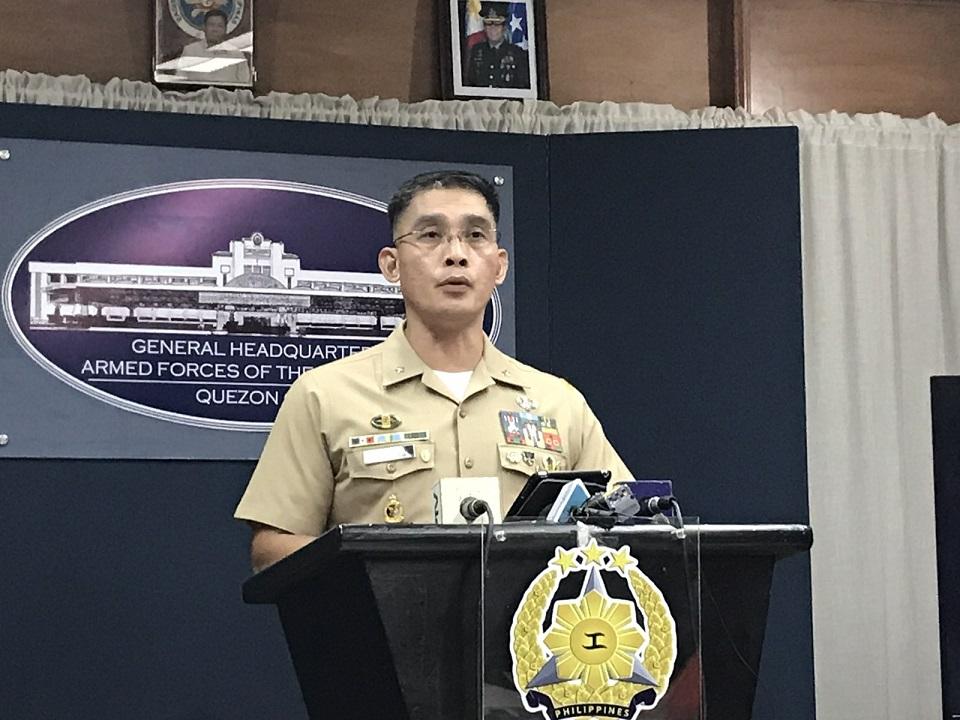After Gapay’s plan to regulate socmed in anti-terror law, AFP spox says gov’t critics not terrorists

Armed Forces spokesman Major General Edgard Arevalo on Wednesday reiterated that those voicing criticisms against the government through the use of social media are not considered as terrorists.
"Kung ang pagpo-post po natin ay pagbatikos o ika nga pagpuna sa mga kakulangan ng ating pamahalaan o mismo ng Armed Forces of the Philippines, hindi naman po ibig sabihin niyan ay ikaw ay isa ng terorista," Arevalo told Dobol B sa News TV.
"Ang sinasabi po natin ay kung 'yung iyong post ay naghahangad na maghikayat upang sumapi sa isang teroristang grupo kagaya ng sinasabi ko ang ISIS ano... ito ay malinaw na panghihikayat na isa sa mga pinagbabawal ng ating anti-terrorism law," he added.
His remark came after AFP chief Lieutenant General Gilbert Gapay said he wants to include provisions in the implementing rules and regulations of the highly-opposed anti-terrorism law that will regulate the usage of social media.
Gapay said social media has been used as a platform for terrorists to recruit the youth and plan their criminal acts.
Arevalo assured the public that Gapay's plan would be coordinated to the other concerned agencies which will craft the new law's IRR.
"Hindi ibig sabihin naman po necessarily ay that per se ang gustong gawin ng Armed Forces, ang gusto po natin ikocoordinate pa rin po ito sapagkat hindi lamang naman po ang Armed Forces of the Philippines ang bubuo ng implementing rules and regulations nito," Arevalo said.
In a separate statement, Arevalo said the end view of this plan is to "prevent the suffering of our people in terms of countless deaths, serious bodily injuries, massive destruction of vital government infrastructures, public and private properties caused by terrorism and violent extremism."
Arevalo said the military would not curtail the public's right to free speech, assembly and redress of grievances as enshrined in the 1987 Constitution.
Authorities not allowed to regulate social media
The Palace already said there is no provision in the Anti-Terrorism Act of 2020 that will allow authorities to regulate the usage of social media. Presidential spokesman Harry Roque said it was an opinion of the new AFP chief.
For Senate Minority Leader Franklin Drilon, Gapay's proposal is illegal and unconstitutional: "There is nothing in the law which would allow enforcers to regulate or control social media. A proper governmental purpose may not be achieved by means that… [invade] the area of protected freedoms."
Muntinlupa City Representative Ruffy Biazon, meanwhile, echoed Drilon, saying that authorities cannot regulate social media as "it is not the intention of the legislators to cross the line of protecting freedom of expression and right to privacy."
Biazon is one of the initial proponents of the law.
Work in progress
Defense Secretary Delfin Lorenzana had said the law's IRR is still a work in progress.
Lorenzana also believes that the controversial law must not regulate social media as it would violate freedom of speech and discourse.
Lorenzana said he already talked to Gapay about his remark. He said Gapay told him that his explanation during the virtual press conference last Monday was incomplete.
"According to him he meant the darknet, that clandestine network that peddles drugs, traffic people, sells guns and explosives, hire assassins and other illegal activities," Lorenzana told reporters.
"But even this is difficult to regulate because it is underground and operates illegally. Also being used to recruit and plan terroristic acts," he added.
President Rodrigo Duterte signed the Anti-Terror Law on July 3 despite apprehensions from the public. The law took effect on the midnight of July 18.
The Department of Justice and the Anti-Terrorism Council, in consultation with law enforcement and the military, are in charge of promulgating the IRR within 90 days after the law takes effect.
Several groups have already challenged the new law before the Supreme Court.
Critics of the law claimed that it contains vague language and lacks clear standards, giving law enforcers on the ground wide discretion to interpret its provisions. — RSJ, GMA News



